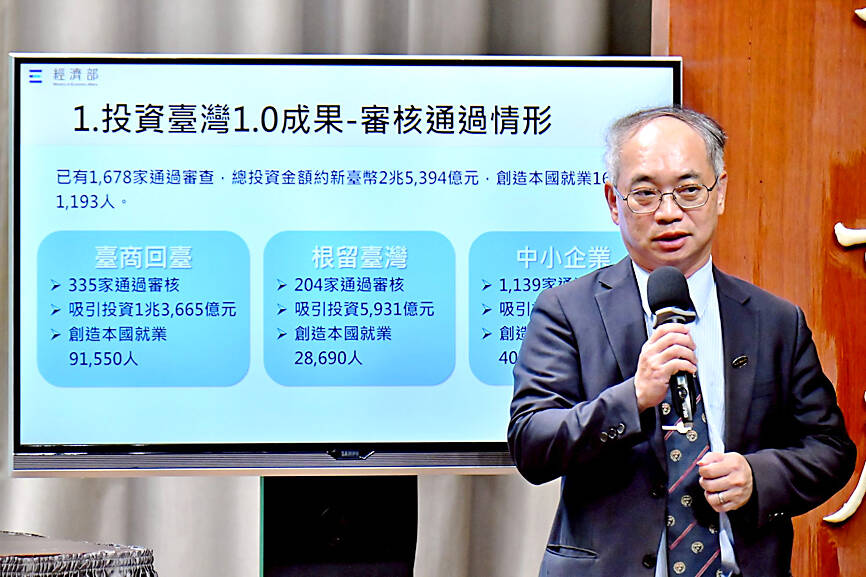The Executive Yuan yesterday approved an extension of the Invest Taiwan program to 2027, while boosting the loan limit to NT$720 billion (US$24.98 billion) from NT$360 billion, expecting to attract NT$1.2 trillion in new investments and 80,000 more employment opportunities.
Launched in 2019 amid a US-China trade dispute, the program has attracted more than NT$2.5 trillion in investment from more than 1,600 companies and created more than 160,000 employment opportunities, Department of Investment Promotion Director-General Emile Chang (張銘斌) said at a Cabinet meeting yesterday.
The program would focus on upgrading the nation’s “five trusted industries,” as well as the service industry, especially logistics and retail, the healthcare industry, the nation’s “six core strategic industries” and the “five plus two” innovative industries, he said.

Photo courtesy of the Executive Yuan
It would also aim to introduce artificial intelligence and smart technologies to companies, he added.
The increased loan limit would be allocated equally to the program’s three schemes: overseas Taiwanese businesses, corporations based in Taiwan, and local small or medium-sized companies, Chang said.
A tiered subsidy mechanism would be adopted to determine the bank fees for large corporations, which would be 0.7 percent of the loan amount if it is less than NT$2 billion, he said.
The rate would be 0.5 percent for loans of NT$2 billion to NT$10 billion and 0.3 percent for those that exceed NT$10 billion, he said.
The bank fees levied on small or medium-sized enterprises would be raised to 1 percent from 0.7 percent at a payment term of three years, he said.
The fees would be reimbursed with the National Development Fund and the Small and Medium Enterprise Development Fund, Chang said.
Mid-level skilled foreign workers would also be included in the extended program to encourage companies to raise domestic workers’ salaries, the Ministry of Economic Affairs said.
Companies offering insured monthly salaries of at least NT$36,300 to domestic employees can hire 10 percent more migrant workers, it said.
If the company offers domestic employees monthly wages of at least NT$38,200, the upper limit of the migrant worker proportion can be raised to 45 percent from 40 percent, it added.
As of the end of last month, 335 companies’ applications to the program have been reviewed and approved, Workforce Development Agency division head Su Yu-kuo (蘇裕國) said.
The Ministry of Labor helped the companies fulfill a workforce gap of 4,900 local workers, while allowing the employment of 5,700 migrant workers, he said, adding that about 1,700 migrant workers were employed under the program as of yesterday.
The ministry would continue to assist local and foreign businesses that set up plants in Taiwan to meet their labor needs, Su said.

Right-wing political scientist Laura Fernandez on Sunday won Costa Rica’s presidential election by a landslide, after promising to crack down on rising violence linked to the cocaine trade. Fernandez’s nearest rival, economist Alvaro Ramos, conceded defeat as results showed the ruling party far exceeding the threshold of 40 percent needed to avoid a runoff. With 94 percent of polling stations counted, the political heir of outgoing Costa Rican President Rodrigo Chaves had captured 48.3 percent of the vote compared with Ramos’ 33.4 percent, the Supreme Electoral Tribunal said. As soon as the first results were announced, members of Fernandez’s Sovereign People’s Party

MORE RESPONSIBILITY: Draftees would be expected to fight alongside professional soldiers, likely requiring the transformation of some training brigades into combat units The armed forces are to start incorporating new conscripts into combined arms brigades this year to enhance combat readiness, the Executive Yuan’s latest policy report said. The new policy would affect Taiwanese men entering the military for their compulsory service, which was extended to one year under reforms by then-president Tsai Ing-wen (蔡英文) in 2022. The conscripts would be trained to operate machine guns, uncrewed aerial vehicles, anti-tank guided missile launchers and Stinger air defense systems, the report said, adding that the basic training would be lengthened to eight weeks. After basic training, conscripts would be sorted into infantry battalions that would take

GROWING AMBITIONS: The scale and tempo of the operations show that the Strait has become the core theater for China to expand its security interests, the report said Chinese military aircraft incursions around Taiwan have surged nearly 15-fold over the past five years, according to a report released yesterday by the Democratic Progressive Party’s (DPP) Department of China Affairs. Sorties in the Taiwan Strait were previously irregular, totaling 380 in 2020, but have since evolved into routine operations, the report showed. “This demonstrates that the Taiwan Strait has become both the starting point and testing ground for Beijing’s expansionist ambitions,” it said. Driven by military expansionism, China is systematically pursuing actions aimed at altering the regional “status quo,” the department said, adding that Taiwan represents the most critical link in China’s

EMERGING FIELDS: The Chinese president said that the two countries would explore cooperation in green technology, the digital economy and artificial intelligence Chinese President Xi Jinping (習近平) yesterday called for an “equal and orderly multipolar world” in the face of “unilateral bullying,” in an apparent jab at the US. Xi was speaking during talks in Beijing with Uruguayan President Yamandu Orsi, the first South American leader to visit China since US special forces captured then-Venezuelan president Nicolas Maduro last month — an operation that Beijing condemned as a violation of sovereignty. Orsi follows a slew of leaders to have visited China seeking to boost ties with the world’s second-largest economy to hedge against US President Donald Trump’s increasingly unpredictable administration. “The international situation is fraught